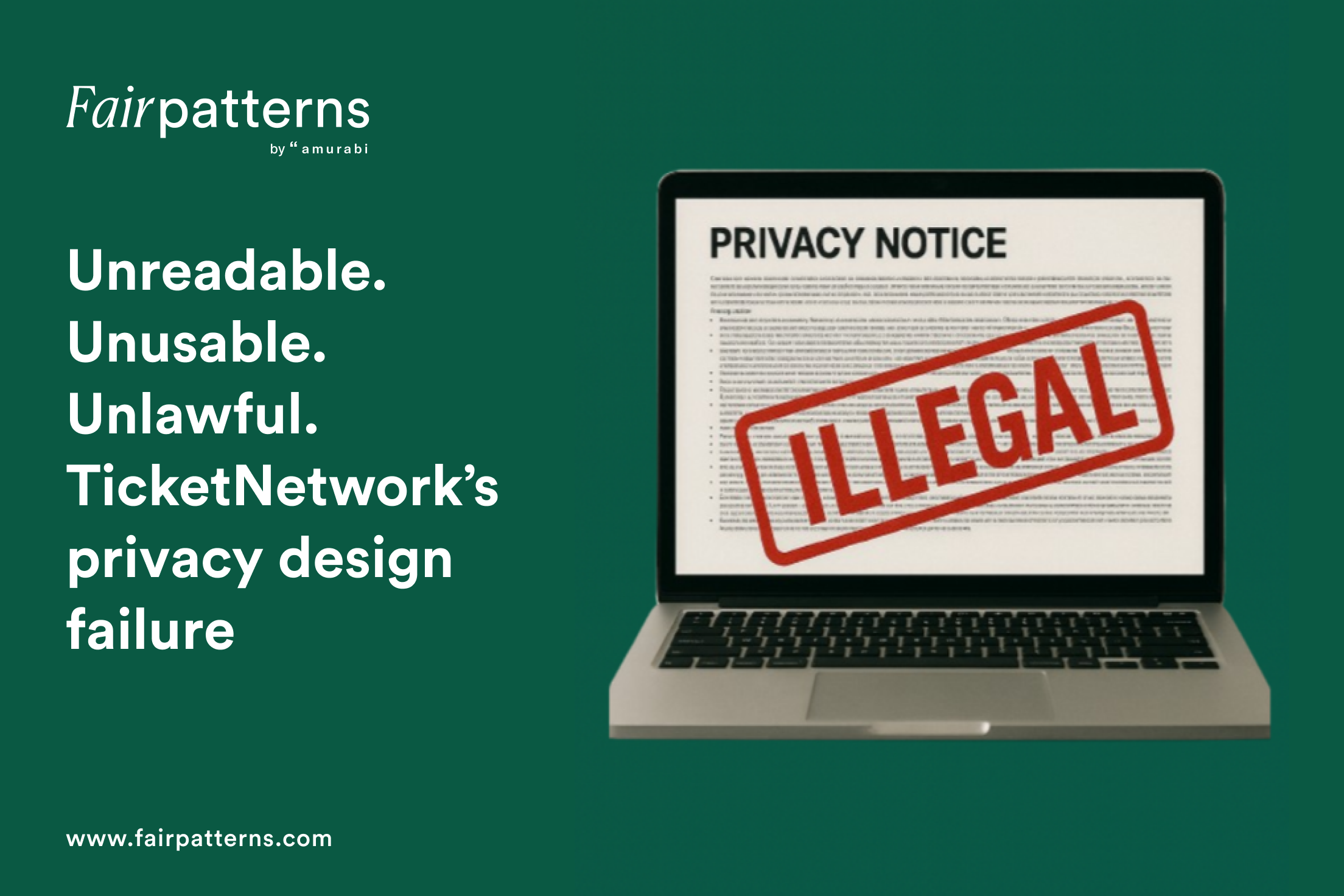Unreadable. Unusable. Unlawful. TicketNetwork’s Privacy Design Failure.

When Privacy Notices Fail:
Are privacy notices really protecting us or just pretending to?
In today’s digital world, users are expected to navigate layers of legalese just to understand how their data is collected or used. The promise is transparency, but the reality is often the opposite. Tiny fonts. Walls of text. Broken opt-outs. Policies buried deep in footers.
Take TicketNetwork, for example. According to Connecticut’s Attorney General, their“privacy notice” was nearly unreadable,, hidden in dense formatting, missing key rights, and paired with broken tools meant to help users opt out or delete their data. And it's a widespread issue.
A recent study shows that the average privacy policy in the US consists of 6,938 words. A person reads approximately 238 words per minute, which means it would take a little over 29 minutes to read an average privacy policy.
We’re not just facing a design flaw, we’re facing a systemic failure of privacy by design. This week, that failure came under formal scrutiny.
Inside the TicketNetwork Case:
On July 2, 2025, Connecticut’s Attorney General announced an enforcement action against TicketNetwork, Inc., one of the largest U.S. ticketing platforms, for violations of the Connecticut Data Privacy Act (CTDPA).
The investigation uncovered three major problems:
Unreadable Privacy Policy: The privacy notice was full of legal jargon, making it difficult for users to understand how their data was handled.
(“written in small font, used large block paragraphs, and was indistinguishably included within one webpage that contained unrelated legal policy disclosures”)
Missing User Rights:It didn’t clearly explain user rights under the CTDPA, like opting out of targeted ads or data profiling.
Broken Opt-Out Mechanism: Eventually, TicketNetwork agreed to fix the link, update its policy, and pay a $7,500 penalty. But the real cost is a loss of user trust—and a wake-up call for digital platforms.
Privacy Promises vs. Legal Reality:
On July 8, 2025, Connecticut Attorney General William Tong announced an $85,000 settlement with TicketNetwork, Inc. for violations of the Connecticut Data Privacy Act (CTDPA).
The investigation found that TicketNetwork:
- Published a 12,000-word privacy policy in a dense, unreadable format
- Failed to clearly explain consumer rights, like data access or deletion
- Offered malfunctioning privacy request tools, with broken buttons
- Omitted accessible contact information for user help requests
While the company did not admit wrongdoing, it agreed to fix these issues and submit compliance reports.
This isn't TicketNetwork’s first time under scrutiny, but it’s a clear sign that unreadable privacy terms and broken consent flows aren’t just bad UX, they're now legal liabilities.
The TicketNetwork case is part of a growing pattern: privacy notices that overwhelm and rights mechanisms that don’t work.
This isn’t just about one business. According to a global study, the average privacy policy takes 27 minutes to read. Multiply that across all the websites we visit, and users would need to spend over 40 hours a month just reading privacy terms.
To stay compliant and build trust, businesses must:
- Use clear, human-readable privacy notices with plain language
- Ensure rights tools (like delete or opt-out) actually work
- Test flows for usability , not just legal checkboxes
- Align legal, product, and UX from day one
With new privacy laws rolling out in multiple states, transparency by design isn’t optional, it’s a baseline.
How Fairpatterns help:
Staying compliant isn’t just about avoiding penalties, it’s about earning trust.
At FairPatterns, we help companies detect privacy dark patterns and fix walls of legalese before they turn into regulatory risks, turning risky manipulative UX into transparent, trust-first design
Our AI tool:
- Detect manipulative patterns across any taxonomy
- Fix them with tested, compliant designs that are easy to implement: in plain language, accessible and engaging, where users easily find the information they need, understand it upon first reading and know what to do with it.
- Prevent future risks with our AI agent that empowers designers to avoid creating new legal breaches at the mock up stage
From detection to redesign, we help companies design for clarity, trust, and compliance, fostering sustainable growth.
Want to lead with clarity and fairness?
Connect with us:https://www.fairpatterns.com/contact-us
💫 Regain your freedom online.
















































